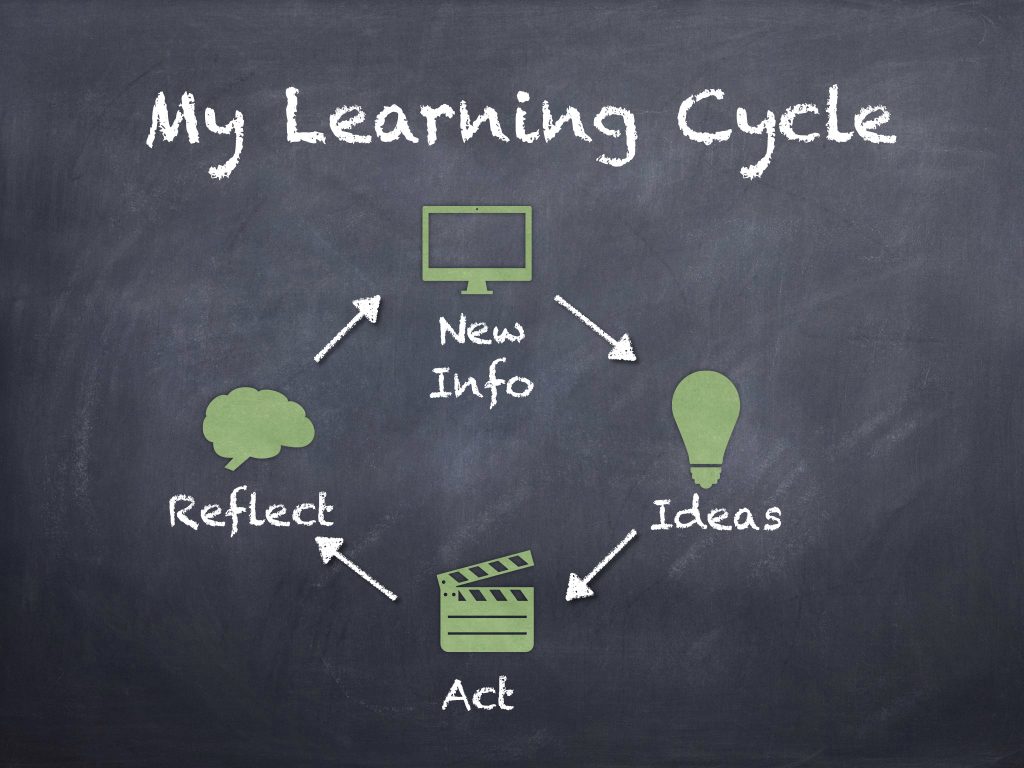The Learning Cycle can change the way you learn; it can help you master any subject or skill by making your learning deeper and much more effective.
Given that learning can change our lives, it might be a useful tool to use!
I would say it’s more than useful, it’s essential, because the exciting thing about learning is that it doesn’t stop when we leave school, in fact for many people, I would say that’s when it starts.
However, I am not selling anything here, (in fact you will have everything you need to know about the Learning Cycle by the end of this article) so let me get real for a minute – this is is not the ‘best’ way to learn!

Useful Tool, Good Practice
Despite many people looking for the best learning solution, there is no one ‘best’ way to learn.
I would even say there is no such thing as a ‘best practice’ because that in itself, suggests there is one way that is better than all the others.
The fortunate truth is that the ‘best way’ to do something, or anything, has not yet been discovered!
We will always develop new and better ways to do things, which is great and inspiring news.
So I prefer to say, there are ‘good practices’ that we can share. Things that tend to work well for a lot of people.
This is the idea behind the Learning Cycle, to share some basic concepts that are commonly accepted as being beneficial to learning.
Three Principles
This a simple cycle of learning that I have used throughout my career in education, teaching hundreds of students and training thousands of teachers in a number of countries.
It’s very much focussed on learning skills, not just learning knowledge.
It’s based on 3 principles:
If you are interested in the various people who discovered, created and moulded these approaches you can do so by clicking the links to each one above.
Four Elements
The cycle of learning looks like this diagram below.
The 4 main elements are
Get new information
Create ideas
Act
Reflect

How does it work?
First of all, you can get new information from websites, reading books, talking to people, studying a course and many more ways.
Once you get new information, the next critical step is to create an idea. Too often we read or see something and think – ‘that’s interesting’ and then do nothing. This is the number one learning opportunity, so do something with that new information.
Having got an idea, you then act on it. You do something. There was a clue in the name of one of the principles – Learning by Doing!
Again, acting is not enough. Often we do something and then forget. The real deep learning happens when we reflect. The type of question you should be asking is
What happened?
Why?
What does that mean for me?
Reflection may lead to seeking out new information or it might lead directly into a new action.
Flexibility
The cycle is very flexible. The key is to be getting new information, creating ideas, doing stuff and thinking about what happened.
It looks simple, and it is, sometimes.
Like many models, the cycle is an attempt to simplify the messy reality of learning. Learning is not linear and never follows a simple cycle like this – it’s much more spontaneous, unruly and hard to tame, which makes it so much fun!
However, the cycle does help us see some of the main factors involved.
The same way government guidelines for nutrition simplify the messy reality of food, so does the learning cycle simplify learning.
You can join the cycle at any point and as learning tends to be organic, shooting off in all directions, it is not something to follow strictly, but to use as a guide.
A key addition to the cycle (that is hard to simplify and show) is ‘sharing’ (of information, ideas and reflections) and this also runs right through the cycle and can happen at any stage.
The Learning Cycle in Action
I thought is might be useful to illustrate a couple of examples of the cycle in action, so you can see how it might work for you.

COOKING EXAMPLE
| What I do | Stage in Cycle |
| I read on a website that rubbing salt into chicken the day before cooking allows the salt to really enter the chicken and makes it taste better | New Information |
| This is worth trying as it might improve my chicken dishes. I decide to have a go. | Get an idea |
| I cook a chicken dish using this technique | Act |
| It tastes much better, but I realise I need to be well organised to do it. | Reflect |
| I decide to share my experience by writing on my blog about it | Act / Share |
| Someone writes a comment on the post saying that by leaving chicken in brine for 30 minutes before cooking has a similar effect. | New Information |
You can see the difference at stopping at stage one, just reading something, and thinking, acting and reflecting, is huge. I stopped the cycle at this last stage, but it could just carry on.
Here’s another example.
NUTRITION EXAMPLE
What I do | Stage in Cycle |
I take a short online nutrition course | New Information |
I discover world dietary guidelines and think they are interesting and useful; I had never seen them before. I should apply them to my diet. | Get an idea |
I decide to apply them to my meals this week, so I start tracking what I eat for 1 week | Act |
I realise I am eating more sugar than the guidelines recommend and a lot of this seems to be from processed food. | Reflect |
I do some research on processed foods, and realise that 2 things I have daily, contain a lot of sugar; Coca Cola and fruit yogurts (I had no idea!) | New Information |
If I can cut out Coca Cola and yoghurt, it might be a good start to healthier eating | Get an Idea |
I try replacing Coca Cola with water each day, and swap my breakfast fruit yoghurt for a natural one. | Act |

Pingback: A Keith Review - Podcast Series Introduction | Seriously Fun Food
Pingback: How to Choose the Best Online Nutrition Course | Seriously Fun Food